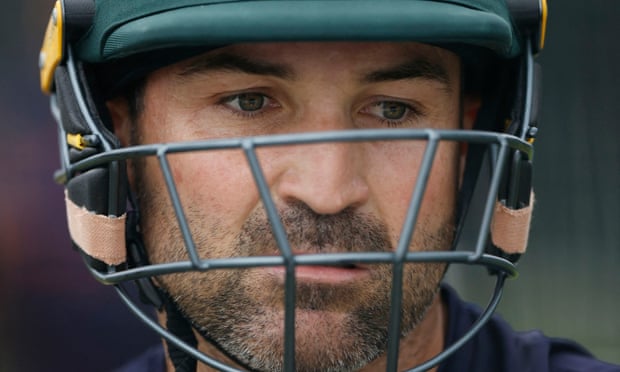After his side’s thumping victory at Lord’s last week the South Africa captain, Dean Elgar, praised his batting unit’s ability to score “ugly runs”. For a man whose own technique has been compared to a scuttling crab, this was a compliment of the highest order.
“We batted hard,” Elgar told the BBC. “We batted really gritty, ugly runs, which was kind of needed on a wicket that was not really batter friendly.”
Such a low-scoring Test – at 640 runs overall, the sixth-lowest in England in a decade – would suggest the surface had dialled up the challenge for those taking guard, but South Africa’s match‑winning score of 326 was about par for a group coming to terms with its own limitations.
Only twice in the past two years have the Proteas managed a total north of 400. That is unsurprising considering no South African batter in the squad averages more than 40. Collectively they have averaged 27 in Tests over the past four years, better only than their counterparts from Zimbabwe, West Indies and Ireland.
At 19th, Elgar – who averages 39.60 overall in Tests – is alone among the top 20 global run-getters in that time with no other teammate in the top 30. This is a precipitous fall for an organisation that could once field Graeme Smith, Hashim Amla, Jacques Kallis and AB de Villiers on the same scorecard.
“We’ve shown we’ve got a lot of great characteristics,” Elgar said before the start of this series. “We’ve shown signs that if we do things the right way we can score those big runs. We did it in New Zealand and in South Africa against India in tough conditions. Sure, we haven’t notched up the hundreds we want, but you’ve got to be mindful of the bigger picture.”
There are some caveats to the accomplishments Elgar cites. In New Zealand, following an innings defeat in the first Test, South Africa made scores of 364 and 353 for nine declared in a 198-run win to square the series. Prior to that, South Africa managed to beat India 2-1 in their three-Test series without passing 300 once.

Elgar paints a picture that is more than the sum of its parts. He is afforded this luxury given the potency of his bowling attack but England will know that there is an obvious weakness to be exploited if only their bowlers can hit their marks.
South Africans registered the two highest partnerships at Lord’s. The opening stand of 85 between Elgar and Sarel Erwee took the game away from England but it might have gone differently had Jimmy Anderson and Stuart Broad had the more favourable conditions that Kagiso Rabada and company were afforded under grey London skies.
If Ben Stokes wins the toss and elects to bowl first in the Manchester gloom, it could be South Africa staring up at a score of 100 for five.
The second noteworthy partnership was a breezy seventh‑wicket cameo between Marco Jansen and Keshav Maharaj worth 72 from 75 balls. They contributed 41 and 48 respectively. Along with Anrich Nortje’s 28 not out, three of South Africa’s bowlers who can bat added 117 to the total.
Maharaj credits his head coach, Mark Boucher, who was entrusted with developing the batting abilities of South Africa’s bowlers during his playing days. He continued his admiration for lower order runs as coach of the Titans where he won five domestic titles. Now, everyone in the Proteas recognises the potential to turn mediocre scores into competitive ones.
“We know how vital those runs can be,” Maharaj said on Tuesday. “You see a lot of the bowlers in the nets facing other bowlers, taking throw-downs, putting in the hours. It’s nice to see us getting the reward.”
Quick Guide
South Africa batting averages
Show
Over the past four years, South Africa’s collective Test batting average has been better than only Zimbabwe, West Indies and Ireland. No one in their XI from Lord’s averages 40 in Tests over the same time period, with only Dean Elgar averaging over 35.
Dean Elgar Test batting average in past four years: 37.06
Sarel Erwee 34.77
Keegan Petersen 34.07
Aiden Markram 27.11
Rassie van der Dussen 32.42
Marco Jansen 23.71
Kyle Verreynne 29.50
Keshav Maharaj 17.38
Kagiso Rabada 11.18
Anrich Nortje 8.41
Lungi Ngidi 4.11
Jansen has said he wants to be regarded as a genuine all-rounder. Maharaj and Rabada are adamant that they have the skill and temperament to average in the 20s. They see themselves as capable batters and so should England.
The sight of Matthew Potts and Stokes hurling down a string of ineffective bouncers to South Africa’s tail was met with incredulous frustration among England followers. “Pitch it up!” was a ubiquitous cry. When Broad eventually did, he had Jansen and the No 11 Lungi Ngidi caught in the slips.
England were poor with the bat but that only half explains why they succumbed to an innings defeat for the 26th time this century. An improved performance will be needed with the ball. It might not take much to run through their vulnerable opponents.



















Discussion about this post